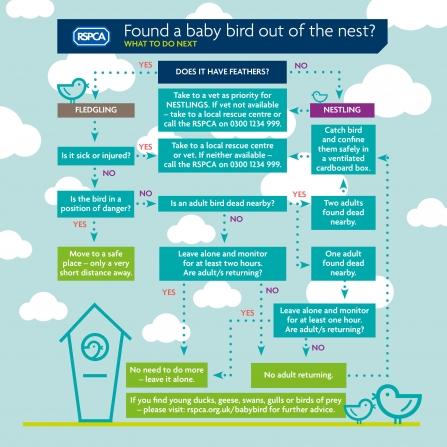Sick, injured, or dead animals
Seeing wildlife can be incredible, but it can be hard to know what to do in certain situations. Maybe you have come across an injured or dead animal, or maybe you suspect that a crime has been committed.
Please scroll through our FAQs below on who to contact if you do find yourself in these situations.
Please note that the Wildlife Trust for Bedfordshire, Cambridgeshire and Northamptonshire does not offer a general service for the care and rehabilitation of wildlife. We also do not offer any services related to the discovery, reporting, or disposal of dead animals, but our advice pages will help you know what to do if you find one.
The Royal Society of Wildlife Trusts also has lots of wildlife advice.
Q: What should I do if I find a recently fledged bird?
It’s common in spring and summer to find young birds sitting on the ground or hopping about without any sign of their parents. The birds are beginning to leave the nests and the parents will usually be close by searching for food and keeping an eye on their chick.
Unless the bird is in immediate danger, it’s best to leave it where it is. If the bird is in a busy road or footpath, or is in danger of being attacked by predators, the bird can be moved a minimal distance but must still be in hearing range of the parents who will be nearby. For more information go to the RSPB website.

Q: What should I do if I find a sick or injured bird/animal?
Do not attempt to handle or transport a swan, goose, heron or gull; keep a safe distance.
The RSPCA and Help Wildlife carry advice that is more detailed on what to do if you find an injured bird or other wildlife. Help Wildlife also have a useful map to help find your local wildlife rescue service. Alternatively, you can contact one of the local specialists below but bear in mind they dot not usually provide transport.
Call the RSPCA if you find an injured swan. Tel: 0300 1234999.
Further contacts:
Cambridgeshire:
-
Cambs Wildlife Care
Tel: 07977 320320Fenland Animal Rescue
Tel: 01902 167296
Northamptonshire:
- 01933 278080
- 07950 062775
What do I do if I find an injured hedgehog?
Hedgehogs usually hibernate between November through to mid March, but they can sometimes be seen out and about during this period changing nesting sites. It is unusual to see a hedgehog staggering around during winter or in daylight, so if you do see one and it looks unwell, it might need a helping hand. Contact the British Hedgehog Preservation Society who can offer advice and help you find a local rescue centre.
Download the Wild About Gardens for Hedgehogs leaflet to find out more about hedgehogs and how to make your garden hog friendly
Shepreth Wildlife Park run a Hedgehog rehabilitation/rescue centre
Hospital Tel: 07505 651968
Out of hours emergency line: 07771 457693
